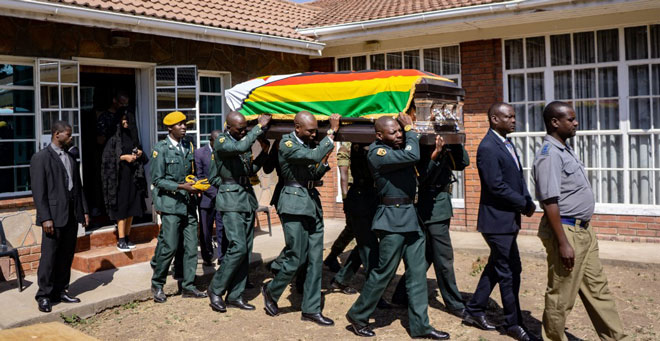
Harare, Zimbabwe | AFP | After weeks of delays Zimbabwe’s former ruler Robert Mugabe was finally buried over the weekend, closing a battle between the state and his family over the fate of his remains.
Mugabe was buried at the weekend in a low-key private ceremony at his natal village.
But the decision to finally bury him at a private rural home amid tight security came after a battle played out for weeks between Mugabe’s family, local traditional chiefs and the government.
Mugabe, who died aged 95 at a Singapore hospital on September 6, was laid to rest 22 days later in a concrete cast grave in the courtyard of his rural Kutama home, 90 kilometres (55 miles) west of the capital Harare.
Inside the grave, the coffin was placed in a container and then covered with a maroon lid. At its head, “R.G. Mugabe” was inscribed on a yellow plate.
Heavy rectangular blocks matching the shape of the grave were piled on top of the coffin, an AFP photographer saw.
The original coffin, in which Mugabe’s remains were flown from Singapore, was changed, said family spokesman Leo Mugabe, the former president’s nephew.
“We wanted a tamper-proof casket because of (the fear of) rituals,” he told the Zimbabwe Television Network last week.
Mugabe had told his wife to guard his body once he died for fear it could be used by his opponents for ritualistic purposes, he added.
“People are after his body or his body parts,” Leo Mugabe was quoted as saying.
– ‘Rituals, privatised legacy’
Family members have said the decision to bury Mugabe at the village should not be misconstrued as bad blood between the government, the ruling party and the former first family, but a fulfilment of his wishes.
The family had initially agreed to a government-sponsored special mausoleum. Its construction was already underway at a public shrine in Harare, where dozens other liberation war heroes are buried.
But in a surprise about-turn it was announced the burial was going to be Kutama village.
It was only at the burial on Saturday that family members explained that Mugabe had indicated that when he died he did not want to be buried at the national shrine because he had been “ridiculed”.
Mugabe was bitter over his ouster nearly two years ago and the role played by his then deputy, Emmerson Mnangagwa, who was elected president after Mugabe was toppled.
A family source told AFP that one family member had even wanted to bury Mugabe on the grounds of his vast Blue Roof mansion in an opulent Harare suburb, but municipal laws forbid burial in non-cemetery designated space.
The burial of the former statesman, who was idolised as a pan-Africanist, has been shrouded in mystery, political intrigue and superstition.
On Saturday Mugabe’s sister Regina Gata praised his widow Grace for “standing her ground and defending the body so that it would not be defiled”.
While she did not name anyone, she said there were people who had wanted to carry out traditional rituals, but “we stood firm because Mugabe was a Christian”.
Nevertheless, one family member has said that hours before the body was brought out of the house for burial, Grace, a traditional chief and a few other relatives had shut themselves in the room where the Mugabe’s body lay in state.
“We don’t know what they were doing and some family members are suspecting there were some rituals,” said the family source, who asked not to be named.
– ‘Political gimmicks’ –
Fewer than 300 relatives attended the burial, and no top government officials were present, something Leo Mugabe refused to comment on.
But for independent political scientist Richard Mahomva, it was tragic that Mugabe’s legacy was being “privatised”, “trivialised” and “villagised” by having him buried in a private space.
“It erases him from his illustrious contribution to the birth of Zimbabwe, it erases him from being an international political stalwart,” Mahomva told AFP.
There has been a “battle for the corpse of Mugabe” between the state and Mugabe’s political allies, he said.
“The state also had interest in the corpse of Mugabe because the state needed legitimacy” following the 2017 coup, he added.
“It was not just a corpse…, it was a corpse that was engraved with so much political access for anyone who is interested in legitimising their political stand.”
The ruling Zanu-PF said in a statement that it respected the family’s wishes to bury him wherever they wanted to.
But it added that it was “saddened when manoeuvres that border on political gimmicks begin to unfold on an issue concerning an illustrious liberation icon”.
 The Independent Uganda: You get the Truth we Pay the Price
The Independent Uganda: You get the Truth we Pay the Price



